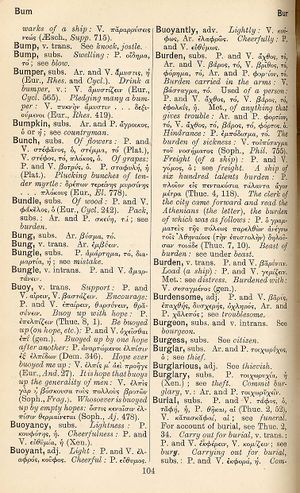burden
Τούτῳ τῷ λόγῳ χρήσαιτο ἄν τις ἐπ' ἐκείνων τῶν ἀνθρώπων οἳ παραδόξως ἀλαζονεύονται, μηδὲ τὰ κοινὰ τοῖς ἀνθρώποις ἐπιτελεῖν δυνάμενοι → One would use this fable for those who give themselves unreasonable airs, but can't handle everyday life (Aesop 40)
English > Greek (Woodhouse)
substantive
P. and V. ἄχθος, τό, Ar. and V. βάρος, τό, V. βρῖθος, τό, φόρημα, τό, Ar. and P. φορτίον, τό.
burden carried in the arms: V. βάσταγμα, τό.
Used of a person: P. and V. ἄχθος, τό, V. βάρος, τό, ἐφολκίς, ἡ.
Met., of anything that gives trouble: Ar. and P. φορτίον, τό, V. ἄχθος, τό, βάρος, τό, φόρτος. ὁ.
the burden of sickness: V. τοὐπίσαγμα τοῦ νοσήματος (Soph., Philebus 755).
freight (of a ship): P. and V. γόμος, ὁ; see freight.
a ship of six hundred talents burden: P. πλοῖον εἰς πεντακόσια τάλαντα ἄγον μέτρα (Thuc. 4, 118).
the clerk of the city came forward and read the Athenians (the letter), the burden of which was as follows: P. ὁ γραμματεὺς τῆς πόλεως παρελθὼν ἀνέγνω, τοῖς Ἀθηναίοις (τὴν ἐπιστολὴν) δηλοῦσαν τοιάδε (Thuc. 7, 10).
beast of burden: see under beast.
verb transitive
load (a ship): P. and V. γεμίζειν.
Met.: see distress.
burdened with: V. σεσαγμένος; (gen.).

